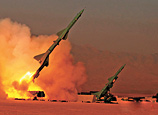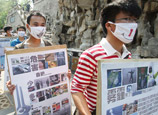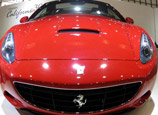
BEIJING, May 9 (Xinhua) -- The excess global liquidity and subsequent capital arbitrage in the Chinese market have pushed up the yuan to new highs in recent tradings, analysts said.
The central parity rate of the yuan strengthened 55 basis points to a record high of 6.1925 against the U.S. dollar on Thursday, after it advanced 103 basis points in the previous day.
Since the beginning of the year, the yuan's central parity has advanced 972 basis points, compared to a total of 146 points it gained last year.
Zhang Mo'nan, an associate researcher at the State Information Center, a government think tank, said the yuan's appreciation is driven up by global quantitative easing and the arbitrage behavior in the Chinese market.
Following monetary easing in the United States and Japan, major economies have recently made new cuts in key interest rates. The central bank of the Republic of Korea on Thursday cut the basic interest rate by 25 basis points, after similar steps of the European Central Bank on May 2, the Indian central bank on May 3 and the Australian central bank on May 7.
The Chinese central bank has chosen to employ the method of reserve repurchase agreement (repo) operations to inject liquidity into the market, while keeping its benchmark interest rate unchanged to avoid a big fluctuation.
Zhang said the comparatively higher level of interest rates in China as compared with other countries created room for arbitrage behaviors.
Arbitrage is the practice of capitalizing on the price difference between two markets. Overseas investors bring their money into the Chinese market, exchange it into the Chinese yuan, and deposit it in banks. After a period of time, investors sell the yuan, reaping returns from a higher interest rate and the yuan's appreciation.
The strong capital inflows are evidenced by the foreign exchange purchases among the Chinese central bank and commercial lenders, said Ding Zhijie, head of the School of Banking and Finance at the University of International Business and Economics.
China has seen four straight months of net forex purchases, which suggests continuous capital inflows, data from the People's Bank of China showed. The banks' average monthly increase of the total yuan holdings for purchasing foreign currency stood at 400 billion yuan (65.2 billion U.S. dollars) in the first four months of the year, nine times of the monthly figure in 2012.
Ding said some speculative money may enter China disguised as trade payments. Some exporters misreport their businesses and inflate the values of goods they sell abroad to channel funds into the country and evade government controls on capital movement.
China reported faster-than-expected export figures in April. Exports rose 14.7 percent year on year, outpacing the reading for March. Meanwhile, the country swung back to trade surplus after posting a deficit in March.
Market observers attributed a low base figure, economic recovery in some developed countries and emerging markets, and Chinese government's supportive policy on trade as main reasons to drive growth.
There have been reports in recent months questioning the data accuracy because they did not match much lower figures reported by other countries and regions, Hong Kong in particular.
Chinese customs authorities responded last month that the difference was the result of different calculating methods and standards.
Ding said the possibility of hot money inflows can not be ruled out.
What is more, Zhang said the arbitrage capital, seeking returns from high interest rates and yuan appreciation, will further push up the value of the Chinese currency, as it increases the demand for the yuan in the Chinese market.
The State Administration of Foreign Exchange said on Sunday it will strengthen oversight on the operations of traders and commercial banks to fend off risks brought by illegal cross-border capital movement.
Ding said the recent appreciation of the yuan also reflects the weakness in China's exchange rate formation mechanism.
Ding said the country has been pursuing a stable exchange rate and the central parity rate has not been able to reflect the actual supply and demand of the market.
Data showed that although the central parity rate has been moving up recently, yuan's exchange rate on the spot market often rose by the one-percent daily trading limit, indicating strong momentum of appreciation.
In a plan announced by China's cabinet earlier this week on deepening economic reform, the government said it will further push forward the market-oriented reforms of the formation systems of foreign exchange and interest rates.
















 S China city looks like Venice after heavy downpour
S China city looks like Venice after heavy downpour


![]()
